Books
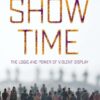
Show Time: The Logic and Power of Violent Display
By Lee Ann Fujii. In Show Time, Lee Ann Fujii asks why some perpetrators of political violence, from lynch mobs to genocidal killers, display their acts of violence so publicly and extravagantly. Closely examining three horrific and extreme episodes—the murder of a prominent Tutsi family amidst the genocide in Rwanda, the execution of Muslim men in a…
Read more
Living in Death: Genocide and its Functionaries.
By Richard Rechtman. Translated by Lindsay Turner. Living in Death: Genocide and its Functionaries is the winner of the French Voices Award for excellence in publication and translation. When we speak of mass killers, we may speak of radicalized ideologues, mediocrities who only obey orders, or bloodthirsty monsters. Who are these men who kill on…
Read more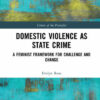
Domestic Violence as State Crime: A Feminist Framework for Challenge and Change
By Evelyn Rose. Domestic Violence as State Crime presents a provocative challenge to the way that domestic violence is understood and addressed. Underpinned by a radical feminist perspective, the central argument of this book is that domestic violence against women constitutes a patriarchal state crime. By analysing the international, collective, structural, and institutional dimensions of this…
Read more
Special issue of Papeles del CEIC: ‘Perpetrators of Mass Crimes in the Light of the Image. Looks, Identities, Testimonies.’
Edited by Vicente Sánchez-Biosca and Lior Zylberman. This special issue offers a contribution to the field of perpetrator studies based on the analysis of images. In particular, it contributes to the debate on the subject from, and based on cases from, Ibero-America. The issue features contributions by Mariana Giordano, Lior Zylberman, and Adriana Taboada, Eyleen…
Read more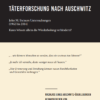
Täterforschung nach Auschwitz : John M. Steiners Untersuchungen (1962 bis 2014) : kann Wissen allein die Wiederholung verhindern?
By Jochen Fahrenberg. (Please note: the announced book below is written in German) The book is dedicated to the biography and academic bequest of John Michael Steiner – a Czech American sociologist born in Prague in 1925, died in Novato, California, in 2014. He survived Auschwitz and other concentration camps and is one of the…
Read more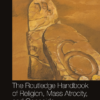
The Routledge Handbook of Religion, Mass Atrocity, and Genocide
By Sara E. Brown and Stephen D. Smith. The Routledge Handbook of Religion, Mass Atrocity, and Genocide explores the many and sometimes complicated ways in which religion, faith, doctrine, and practice intersect in societies where mass atrocity and genocide occur. This volume is intended as an entry point to questions about mass atrocity and genocide that…
Read more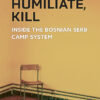
Torture, Humiliate, Kill: Inside the Bosnian Serb Camp System
By Hikmet Karčić . Half a century after the Holocaust, on European soil, Bosnian Serbs orchestrated a system of concentration camps where they subjected their Bosniak Muslim and Bosnian Croat neighbors to torture, abuse, and killing. Foreign journalists exposed the horrors of the camps in the summer of 1992, sparking worldwide outrage. This exposure, however,…
Read more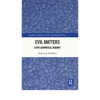
Evil Matters: A Philosophical Inquiry
By Zachary J. Goldberg. This book is an inquiry into particular matters concerning the nature, normativity, and aftermath of evil action. It combines philosophical conceptual analysis with empirical studies in psychology and discussions of historical events to provide an innovative analysis of evil action. The book considers unresolved questions belonging to metaethical, normative, and practical…
Read more
La muerte en los ojos: Qué perpetran las imágenes de perpetrador
By Vicente Sánchez-Biosca. ¿Qué tienen en común las fotografías de vejaciones humanas de Abu Ghraib, el álbum de Auschwitz y las fotos de prisioneros arrancadas por los torturadores de las más feroces dictaduras de Chile, Argentina, Brasil o Camboya? Más allá de su contenido, todas ellas son “imágenes de perpetrador”: encarnan el punto de vista de…
Read more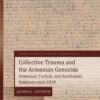
Collective Trauma and the Armenian Genocide: Armenian, Turkish, and Azerbaijani Relations since 1839
By Pamela Steiner. In this pathbreaking study, Pamela Steiner deconstructs the psychological obstacles that have prevented peaceful settlements to longstanding issues. The book re-examines more than 100 years of destructive ethno-religious relations among Armenians, Turks, and Azerbaijanis through the novel lens of collective trauma. The author argues that a focus on embedded, transgenerational collective trauma…
Read more
